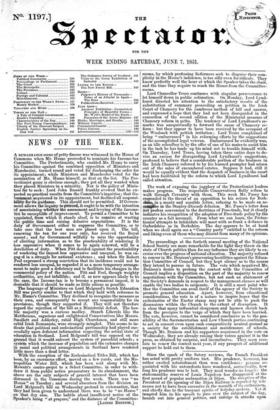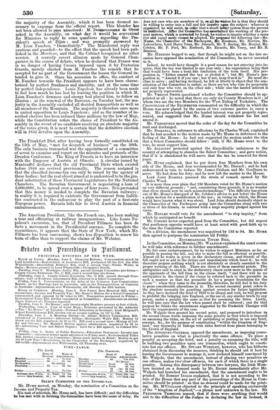Since the epoch of the Satory reviews, the French President
has acted 'with pretty uniform tact. His prudence, however, has rather excited' astonishment than won confidence : persons ac- quainted with his antecedents have wondered, sarcastically, how ,
long his prudence was to last. They need wonder no longer: the statesmanlike reservb of Louis Napoleon has disappeared at the first sound-of popular acclamation at Dijon. The reception of the President at the opening-of the Dijon Railway is reported by wit- nesses not to have-been- excessive in the warmth of its enthusiasm, and chiefl3r,duatii the buoyant spirits of holyday-makers. Yet it tempted him- in- his -speech - to -pass over the subject of the day, launch out into general politics, and indulge in attacks upon the majority of the Assembly, which it has been deemed ne- cessary to expunge from the official report This blunder lias not been allowed to pass unnoticed : M. Desipoussoatut do Givre asked in the Assembly, on what day it would be convenient for Ministers to reply to some }ueations }regarding the Pre- sident's speech at Dijon ; and was promptly answered by M. Leon Faucher, " Immediately." The Ministerial reply was cautious and guarded—to the effect that the speech had been pub- lished in the lifoniteur, and that the Cabinet recognized no other version. A scarcely covert allusion made by General Chan- gamier in the course of debate, when he declared that France was in no danger of having Caesars imposed upon it by Praetorian Guards, merely elicited from M. Faucher the remark that he accepted for no part of the Government the lesson the General in- tended to give it Since his accession to office, the conduct of M. Faucher towards the President appears to have been charao- terized by perfect frankness and sincerity, and at the same time by perfect independence. Louis Napoleon has already been made to feel how much he has lost by leaving the position in which M. Leon Faucher's firmness and energy had placed him, to follow an illusion : at the renewal of the Bureaux, on Tuesday last, the ma- jority in the Assembly excluded all decided Bonapartists as well as all members of the Mountain. The majority is therefore once more in united opposition to Louis Napoleon ; and as the number of in- scribed electors has been reduced three millions by the law of May, while the Constitution refers the choice of President to the As- sembly in the event of no candidate receiving an absolute majority of the votes given, it is next to certain that the definitive election will in 1852 devolve upon the Assembly.



























 Previous page
Previous page